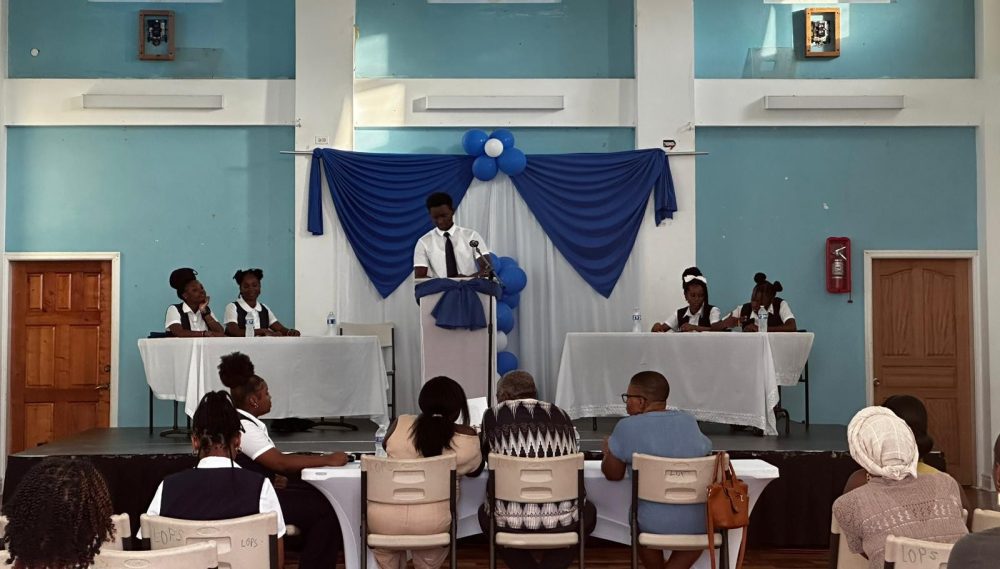
While the November 18 General Elections were a procedural success according to international observers, their preliminary findings highlight a number of areas which Montserrat must rectify to serve the needs of its populace.
Seven international observers took part in the Mission led by Hon Julian Robinson MP, Jamaica, Harald Jepsen, Denmark, Anne Marlborough, Ireland, Aurjul Wilson, Anguilla, Martyn Perkins MHK, Isle of Man, Mariam El-Azm, France and Felicity Newall, UK.
On Wednesday morning, four members of the Election Observation Mission led by MP Julian Robinson from Jamaica shared their initial recommendations with the press.
Robinson called the election “a real procedural success”. adding that they were “impressed by the way the elections were administered and by the diligent efforts of all polling staff across the six divisions. Whether people are in agreement with the results of the elections or not, they can be confident that the results does represent the will of the people of Montserrat.”
The Mission run by the British Islands and Mediterranean region of the Commonwealth Parliamentary Association (CPA BIMR) visited all 12 polling stations across six divisions on polling day. In the run up to 18 November, the Mission met with key stakeholders including electoral officials, candidates, members of the public and attended main political rallies to gain a better understanding of the electoral process and political context of the election.
At the closing press conference they presented the following key preliminary findings:
• Voting was administered in an orderly, well-organised and transparent manner
• The counting process was highly professional and conducted with rigour and the highest level of transparency far beyond legal requirements
• It is apparent that the Electoral Commission enjoys the trust of both the public and the political parties, with confidence expressed both in its impartiality and its ability to conduct the elections correctly.
The Montserrat EOM 2019 Preliminary Report also mentions areas where further improvements would be needed to make the process more inclusive and efficient for future elections. These relate to:
• Secrecy of the vote – potential breaches to the secrecy of the vote remain in the inclusion of a serial number on the ballot paper
• Right to stand – The protection of the right to stand for election is not in full compliance with international law. A distinction is made between Montserratians by birth and those who have acquired nationality by naturalisation. This amounts to discrimination, which appears unreasonable
• Review of the electoral system – a consideration should be given on whether single-member constituencies could enable more direct representation of communities
• Regrettably, just one woman has been elected, representing just eleven per cent of those elected.”
On the matter of privacy, the voting process used included staff writing the number assigned to each registered voter on the back of their ballot which was also associated with the number on the counterfoil. This issue was flagged by several voters to Discover Montserrat as a reason they chose not to exercise their right to vote due to the possibility of discovery.
Mission member Anne Marlborough of Ireland highlighted that “the protection of the right to stand for election is not in full compliance with international law. A distinction is made between Montserratians by birth and those who have acquired nationality by naturalisation. This amounts to discrimination, which appears unreasonable. Dual citizenship is also a disqualification from standing for election. This appears somewhat harsh in the context of the particular geopolitical realities of emigration from Montserrat following the series of natural
disasters which has befallen the island.”
The report also notes that “there are no provisions regulating political finance. The law is silent about donations and expenditures of political parties and contestants for their campaigns, and there are no disclosure requirements. This undermines voters’ right to an informed choice. Potentially contentious issues such as foreign (diaspora) donations and participation of non-nationals in the election campaign are not regulated.
It also flagged that the issue of persons with disabilities and senior citizens who may be unable to visit a polling booth or impairments which make it impossible for them to use a paper ballot should have other means of exercising their right to vote.
Mission officials said the Election Reform Commission needs to be revitalised and the third member added. They said it would be prudent for Montserrat to take action rather than another five years go by without any of the issues addressed. Many of these issues were flagged in the report issued by a previous mission following the 2014 General Elections.
Observers will be producing their final report within two months. The final report will provide further information on the areas considered by the Mission and will include practical recommendations to improve compliance to international standards and improve the overall process for future elections.
The report will be made available on https://www.uk-cpa.org/what-we-do/elections/ and on the Montserrat Electoral Commission’s website. For further information and to get in touch with the Mission, please contact us at montserratelectionobservers@gmail.com or tweet @CPA _BIMR and #MontserratEOM.
Read the Montserrat EOM 2019 Preliminary Report here.
Discover more from Discover Montserrat
Subscribe to get the latest posts sent to your email.



